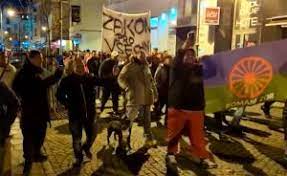
Roma demonstrate against assaults allegedly targeting them on Stodolní Street in Ostrava, Czech Republic, call for more police there
About 150 Romani people demonstrated on Stodolní Street in Ostrava, Czech Republic, against the violent assaults they allege have targeted them there. In response to more than one such incident in recent weeks there, Romani influencer David Mezei called the protest.
Police surveilled the demonstration. “Just in January, two such cases happened when security guards beat up young visitors for no reason other than that they were Romani. This cannot be allowed to continue. The police investigate, but nothing ever comes of it,” Mezei told the media outlets at the scene.
The Romani demonstrators began their march at the intersection of Nádražní and Stodolní Streets, stopped at one of the bars in question, then headed for the Masná Street police station. “Police should send more patrols to Stodolní Street and should ban minors from entering the bars. We do not want any more of these incidents,” Mezei challenged the officers in front of the station.
“God forbid something worse were to happen, that would provoke us and then something even worse would happen,” Mezei said. The Romani demonstrators chanted “We’ve had enough!”, “We want the law to apply to all!” and “This is our home!”
Video: https://www.facebook.com/udalostiostrava/videos/1399874777218423/








